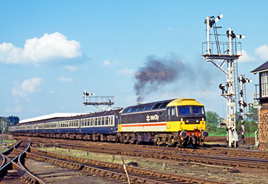The whole regulatory framework put in place by the Railways Act 1993, and its subsequent amending pieces of legislation, is still technically in place, but the Office of Rail and Road (ORR) has been left with a much-diminished role. It is not yet clear how well the concept of a five-year financial framework with high-level objectives agreed in advance, and handed to Network Rail to deliver with regulatory review by ORR, will survive its first encounter with the real world of politics and the all-too-obvious need to control Network Rail’s spending on enhancements.
If I was trying to predict what the next five-year regulatory cycle will look like, I think it might look something like this: the Statement Of Funds Available will be for a reduced overall total; the list of enhancement schemes will be shorter and less explicit than before; there will be a renewed emphasis on value for money in the renewals and enhancements areas; and a focus on benchmarking through a much more regionalised approach to regulating Network Rail’s activities.
If you have been following my line of thought so far, you will have come to appreciate that the argument about whether our railways should be nationalised or privatised is a sterile one - they are effectively nationalised already in all but name.
However, what tends to exercise the minds of left-leaning politicians and the wider public at large is those pesky franchises. Why should private companies be brought in to operate public service contracts, and make a profit on these that is then removed from the industry and paid to shareholders?
What makes it worse is that many of these pesky people are, in fact, offshoots of foreign state rail operators. This means, so the argument goes, that profits made for doing nothing useful in the UK are subsidising foreign state railways. Meanwhile, our own state organisation is specifically debarred from bidding for franchises.
Let’s deal first with the foreign state operator issue. These organisations have identified Great Britain as an open and competitive market, one where they can bring fresh expertise to bear as well as broaden their own expertise and strengthen their market position as railways across Europe are gradually liberalised.
Through bidding in Great Britain, they are exposed to the same downside risks and upside benefits as any of the private sector players. They could just as easily lose money here as turn a profit, and in being here they are doing something very important for the Government - they are strengthening the market for franchises. This acts to make the competition stronger, and thus achieve better value franchise deals. This must be good for us taxpayers here in the UK.
In reality, it’s a very good job that the likes of Abellio, DB, SNCF and so on have been active in Great Britain. Why? Well, the percentage of revenue that a franchisee makes in profit is more normally called a ‘margin’.
Margins are determined competitively - you bid a particular margin, but what you actually get can be more or less than this depending on whether you achieve your revenue and cost predictions as set out in your bid. Typically, margins of 5% or more were achievable in the early years of franchising. More recently, margins have tightened. Companies may bid a margin of 3.5% to 4%, but actually realise a much lower percentage than this. This happens because either revenue falls short of predicted levels, or else costs rise faster than planned.
In the past couple of years, margins have averaged between 2% and 3%. While some have done well - Merseyrail for example - others, such as GTR, have made losses.
Margins as low as 2% are not sustainable for franchises where revenue is at the franchisee’s risk. The owners of these companies can earn better returns by using their limited capital and expert resources elsewhere. This is why the market for franchises has weakened worryingly in the past two years, with only two bidders for the recent competition for the big South Western franchise - one that should be seen as a jewel in the crown!
This also explains the recent decision by the National Express Group to get out of rail franchising in Great Britain, and its subsequent sale of the c2c franchise to Trenitalia (for what will, I’m sure, come to be seen as a very good deal for National Express). These are worrying developments.
It would be possible to allow franchises to lapse at the end of their terms, and to create an in-house company to operate rail franchises in the public sector. But I don’t favour this approach, and I say this as someone who has personal experience of running two such franchises in the public sector in recent years.
This is because my experience tells me two really important things. The first is that governments are not very good at delivering public services themselves -there is a tendency to meddling, short-termism, starvation of funding, and nakedly politicised decisions every time things get difficult. Much better to set out the framework of what you want to achieve over a period of time, and then contract with a focused and properly incentivised company to deliver your requirements.
East Coast was undoubtedly a success during its five and a half years in the public sector. It returned well over £1 billion in profits to the Treasury during this time.
But despite having chaired the company, I wouldn’t advocate running franchises this way as the norm. It worked well because we worked very hard with some top-notch very senior civil servants to make it work well, and because we ran it as far as possible as if it was in the private sector.
But because it was relatively small-scale, and temporary in nature, we managed to work round some of the difficulties that publicly owned companies can suffer from, and to which I have alluded earlier. If it was put on a bigger scale and onto a long-term footing, then these problems would surely surface as big problems interfering to prevent the effective and efficient running of these businesses.
My second reason for not running franchises in the public sector is this: a properly run competition really does drive innovation and value for money. The evidence is all around us. I know from my own experience of leading franchise bids that you don’t win them by being conservative with your revenue proposals or profligate with your costs.
Franchising has produced a growing railway that enables more economic activity and can improve social cohesion, all while reducing the net cost to the taxpayer. We need to take steps to protect franchising now because it has done a lot for us over the last 20 years, but it needs reinvigorating with new players.
To attract these new players, there must be an opportunity to make a reasonable return for doing a great job. It is government’s role (both national and devolved) to create the right policy conditions to enable franchising to flourish in the future.
This article can be found in: RAIL 827: May 24 2017 - June 6 2017














Comment as guest
Comments
Paul Horrell - 08/06/2017 14:04
Couple of things you choose to forget. First, the reason Network Rail is nationally owned is that it was privatised as Railtrack but that it performed so lamentably that it became effectively bankrupt. Govt took it back to keep it running. Shareholders then screamed for compensation! But surely if a private entity performs so badly that its share price reduced to zero, then that is simply capitalism in action. Network Rail works, and is nationalised. Second, you cite franchise holders which are themselves foreign nationalised entities, such as SNCF. Whayt have our trains owned by foreign Governments and have profits expatriated, when we could own them ourselves?
Reply as guest
G. P. Brown - 06/07/2017 22:28
"Network Rail works" LOL Why are foreign companies running some of our services ?Because they quoted either a higher premium or lower subsidy to run the services decided upon by the DfT and therefore reduced the cost of running our railways. You obviously assume that a nationalised industry would have created the growth in traffic that privatisation has. I rather doubt it, but that is where the companies have made their profit by putting extra bottoms on seats in a relatively fixed cost environment. I wonder why the EU requires passenger services to be tendered - because nationalised companies are generally more expensive and offer a crap service - you get what they decide to give you. Yes, even the French are moving towards tendering under EU rules. Provence Alpes Cote D'Azur region cannot wait to get rid of SNCF.
Reply as guest